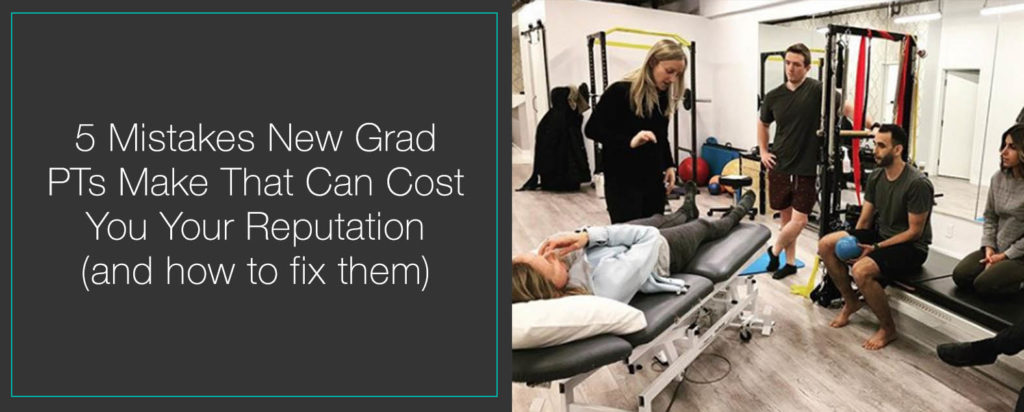By Shafiq Bhanji, BSc, PT, MBA
Starting out as a new grad was a frightening time for me. I wasn’t quite sure about my skills yet and was nervous around patients. Right out of school I soon realized that what I learned in school was very different from the real world.
I was not prepared to say the least and was questioning whether I could make it as a physiotherapist. I first started out working full time during the day for one private practice. Then after that, I would head over to various other clinics to work in the evenings.
I saw how one clinic owner ran his/her practice was very different from another. At certain clinics there was very little or no mentorship or support in place for new physiotherapists. Certain practices had mentorship programs that were pretty good, whereas others were not well-organized and had no structure.
Drawing on some of these unique experiences, and building a network of over 20 multidisciplinary clinics across Ontario, I have come to learn that a good mentorship program is essential and is certainly needed in private practice if we want our newly graduating physiotherapists to be successful. With the help of our Mentorship Program Directors, Julia Cetnar and Joelle Karam, we have hired many new grads and are turning them into well-respected and well-paid physiotherapists through our structured and unique mentorship program.
In this blog post, Julia, Joelle, and I are going to reveal the 5 biggest mistakes new grads make and how to avoid them. Understanding these 5 mistakes will put you far ahead of all the other new grads and on the path to success.
So let’s get started…
5 Mistakes New Grad Physiotherapists Make:
1. Fake it till you make it
This advice may work in some careers but not for physiotherapists, and it can actually destroy your career. Your patients (and the clinic owner) will be able to tell if you are faking it. This will cause mistrust with your patients and not a good way to start the physio/patient experience, or the physio/private practice owner experience.
What you should do instead is be real and genuine. Tell them the truth. For example, we advise new grads that when a patient says “What’s causing this problem?” and you don’t know the answer, you can simply say, “You have limited range of motion in these directions, or these particular muscles aren’t firing as well as they should, etc. and maybe we don’t know how all these findings fit together yet, but we’ll work with what we have so far and this will help us gather more information.”
Being honest and upfront builds trust and a good relationship with your patient.
2. Being overly anxious and nervous
Being a new grad is scary in the beginning. When I first started out, I was a nervous wreck. I was not sure about my skills and my ability to get the outcomes my patients wanted. I was worried I would look incompetent or unqualified in front of my patients and my new boss.
This often caused me to be stiff, cold, and nervous around my patients. I soon found out that the patient felt that, which made them uneasy.
So it’s important to just relax. Here’s how… whatever you focus on you’ll feel. Don’t focus on making mistakes or messing up. Instead just focus on the patient. Breathe deeply and slowly. This will make you feel relaxed.
This will put your patients at ease and build trust, and you will help them achieve better outcomes.
If you make a mistake just learn from it and move on. The most experienced physiotherapists have made many mistakes that they have learned from and that have just helped them to get better.
3. Not asking for follow-up appointments
Many new grads don’t ask for follow-ups because they’re unsure of how many visits the patient may need. This leads to poor outcomes for the patient and hurts the confidence of the physiotherapist because the patients are not having positive outcomes.
Don’t be afraid to book longer follow-up sessions or more frequent sessions early on in the treatment. You can always adjust it based on their progress. Even experienced physiotherapists don’t always know how long a treatment plan will take because every patient and every condition is different.
Patients are looking for guidance on what to do. They want you to tell them what they need to do to achieve their goals. If they see no end in sight or a clear plan in place, they won’t be motivated, which will dramatically hurt compliance, and they may not come back. After their first session with you, they should know the plan going forward.
4. Doing more than you should
We see this all the time with new grads. They have so much knowledge and are eager to tell the patient everything they know about the topic. They get too ambitious with their home exercise program, leading the patient to feel confused and overwhelmed. Not sure whether they’ll be able to follow through on the treatment plan, the patient just ends up giving up.
You don’t want to overwhelm your patient. Instead, you want to first build a solid foundation. For example, once the patient is doing foundational movements correctly, then you gradually move them to higher-level exercises. Just keep it simple and don’t throw hundreds of exercises at them at once. Don’t try to give them everything in the first visit.
By doing this your compliance rate will skyrocket and you’ll get better results for your patients.
5. Not having a supportive practice setting
Your practice setting should support you in getting the best possible outcomes for your patients. You shouldn’t feel pressured to overbook or speed through an assessment or treatment with your patients. Make sure the clinic gives you enough time to spend with each patient. Be sure to ask questions to the clinic owner about length of appointments and booking frequency before you start working to make sure your expectations are in alignment with each other.
You also want to have a supportive team around you that can give you guidance when you need it. A clinic that has good mentorship options for you is key. If you decide to run your own practice, make sure you have a good support network outside of your clinic or make sure that you build one.
There you have it – The 5 mistakes new grads make. Understanding and avoiding these mistakes will allow you to accelerate your career and avoid the pitfalls that so many of us have made as new physiotherapists.
ABOUT ATHLETE’S CARE
If you are looking to start your career with a company that is focused on personal and professional support and development, please feel free to reach out. Athlete’s Care Sports Medicine Centres has 21 multi-disciplinary locations throughout southern Ontario, and we are always looking to bring on motivated new graduates to join our team. Our multidisciplinary model of care includes physiotherapists, massage therapists, chiropractors, sports medicine doctors, orthopedic surgeons, and physiatrists.
We will introduce you to our unique and supportive mentorship program that will accelerate your career and your professional growth. You’ll have access to a personal mentor that will be there to help guide you along the way. We provide a supportive environment that allows you to learn while growing as a professional, and we’ll even give you financial support for continuing education. You’ll get the advanced skills you need to become a well-paid and well-respected physiotherapist, and you’ll quickly gain more confidence in your abilities.
If you’re a new grad and this is something you may be interested in or you would like more information, please shoot me an email at shafiq@athletescare.com
You can follow us on Instagram here: https://www.instagram.com/athletescare/?hl=en



